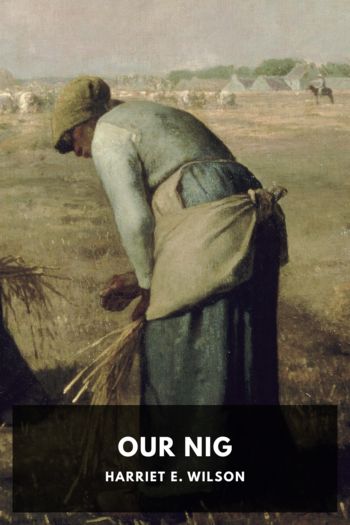Our Nig - Harriet E. Wilson (small books to read txt) 📗

- Author: Harriet E. Wilson
Book online «Our Nig - Harriet E. Wilson (small books to read txt) 📗». Author Harriet E. Wilson
The evening before I left for my dreaded journey to the “house” which was to be my abode, I packed my trunk, carefully placing in it every little memento of affection received from you and my friends in W⸺, among which was the portable inkstand, pens and paper. My beautiful little Bible was laid aside, as a place nearer my heart was reserved for that. I need not tell you I slept not a moment that night. My home, my peaceful, quiet home with you, was before me. I could see my dear little room, with its pleasant eastern window opening to the morning; but more than all, I beheld you, my mother, gliding softly in and kneeling by my bed to read, as no one but you can read, “The Lord is my shepherd—I shall not want.” But I cannot go on, for tears blind me. For a description of the morning, and of the scant breakfast, I must wait until another time.
We started. The man who came for me was kind as he could be—helped me carefully into the wagon, (for I had no strength,) and drove on. For miles I spoke not a word. Then the silence would be broken by the driver uttering some sort of word the horse seemed to understand; for he invariably quickened his pace. And so, just before nightfall, we halted at the institution, prepared for the homeless. With cold civility the matron received me, and bade one of the inmates show me my room. She did so; and I followed up two flights of stairs. I crept as I was able; and when she said, “Go in there,” I obeyed, asking for my trunk, which was soon placed by me. My room was furnished some like the “prophet’s chamber,” except there was no “candlestick;” so when I could creep down I begged for a light, and it was granted. Then I flung myself on the bed and cried, until I could cry no longer. I rose up and tried to pray; the Saviour seemed near. I opened my precious little Bible, and the first verse that caught my eye was—“I am poor and needy, yet the Lord thinketh upon me.” O, my mother, could I tell you the comfort this was to me. I sat down, calm, almost happy, took my pen and wrote on the inspiration of the moment—
O, holy Father, by thy power,
Thus far in life I’m brought;
And now in this dark, trying hour,
O God, forsake me not.
Dids’t thou not nourish and sustain
My infancy and youth?
Have I not testimonials plain,
Of thy unchanging truth?
Though I’ve no home to call my own,
My heart shall not repine;
The saint may live on earth unknown,
And yet in glory shine.
When my Redeemer dwelt below,
He chose a lowly lot;
He came unto his own, but lo!
His own received him not.
Oft was the mountain his abode,
The cold, cold earth his bed;
The midnight moon shone softly down
On his unsheltered head.
But my head was sheltered, and I tried to feel thankful.
Two or three letters were received after this by her friends in W⸺, and then all was silent. No one of us knew whether she still lived or had gone to her home on high. But it seems she remained in this house until after the birth of her babe; then her faithless husband returned, and took her to some town in New Hampshire, where, for a time, he supported her and his little son decently well. But again he left her as before—suddenly and unexpectedly, and she saw him no more. Her efforts were again successful in a measure in securing a meagre maintenance for a time; but her struggles with poverty and sickness were severe. At length, a door of hope was opened. A kind gentleman and lady took her little boy into their own family, and provided everything necessary for his good; and all this without the hope of remuneration. But let them know, they shall be “recompensed at the resurrection of the just.” God is not unmindful of this work—this labor of love. As for the afflicted mother, she too has been remembered. The heart of a stranger was moved with compassion, and bestowed a recipe upon her for restoring gray hair to its former color. She availed herself of this great help, and has been quite successful; but her health is again falling, and she has felt herself obliged to resort to another method of procuring her bread—that of writing an Autobiography.
I trust she will find a ready sale for her interesting work; and let all the friends who purchase a volume, remember they are doing good to one of the most worthy, and I had almost said most unfortunate, of the human family. I will only add in conclusion, a few lines, calculated to comfort and strengthen this sorrowful, homeless one. “I will help thee, saith the Lord.”
“I will help thee,” promise kind,
Made by our High Priest above;
Soothing to the troubled mind,
Full of tenderness and love.
“I will help thee” when





Comments (0)